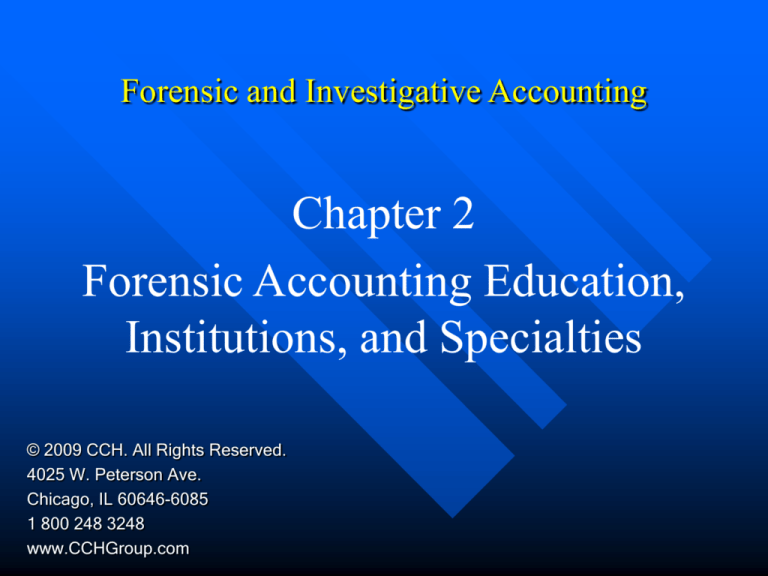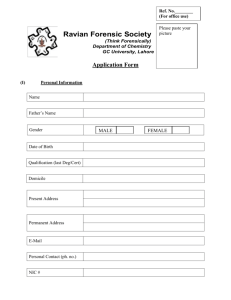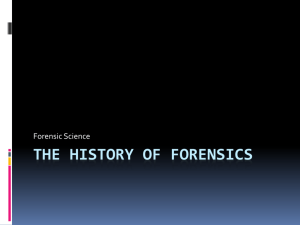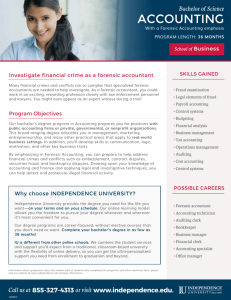
Forensic and Investigative Accounting
Chapter 2
Forensic Accounting Education,
Institutions, and Specialties
© 2009 CCH. All Rights Reserved.
4025 W. Peterson Ave.
Chicago, IL 60646-6085
1 800 248 3248
www.CCHGroup.com
Termites, Rust, and Fraud
Just as termites never sleep, fraud never
sleeps.
Just like termites, fraud can destroy the
foundation of an entity.
Chapter 2
Forensic and Investigative Accounting
2
Professors’ Top Ten Topics in
Forensic Accounting Curricula
1.
2.
3.
4.
5.
Fundamentals of fraud.
Financial statement fraud.
Types of fraud.
Cooking the books and problems in
accounting.
Elements of fraud: pressure, opportunity, and
rationalization.
(continued on next slide)
Chapter 2
Forensic and Investigative Accounting
3
Professors’ Top Ten Topics in
Forensic Accounting Curricula
Antifraud controls.
7. Internal control evaluation.
8. Theory and methodology of fraud
examination.
9. Principles of ethics and corporate code of
conduct.
10. Fraud detection and deterrence programs.
Practitioners tend to emphasize litigation service
more than professors.
6.
Chapter 2
Forensic and Investigative Accounting
4
Knowledge, Skills and Abilities
Needed by Forensic Accountant
Law, legal system, courts, and courtroom
procedure.
Financial statement fraud.
Corporate governance, shareholder rights and
litigation, securities laws, and protections.
Report writing and communication.
Criminal law and procedure.
(continued on next slide)
Chapter 2
Forensic and Investigative Accounting
5
Knowledge, Skills and Abilities
Needed by Forensic Accountant
Computer fraud and cybercrime.
Human factors involved in intelligence
gathering, interview techniques and
understanding the motivations for fraud and
other criminal activities.
Ethical issues in business.
Business valuation.
Chapter 2
Forensic and Investigative Accounting
6
Find It, or I’ll Sue
Accountants must be attuned to detecting
fraud at every level of service, including standard
accounting services, compilations, reviews, and
bank reconciliations. If there is fraud and you
don’t detect it, you are going to be sued, and you
will likely lose, as the public perception is the
accountant is the watchdog.
Robert J. DiPasquale, Parsippany, N.J.
Source: H.W. Wolosky, “Forensic Accounting to the Forefront,” Practical Accountant,
February 2004, pp. 23-28.
Chapter 2
Forensic and Investigative Accounting
7
Forensic Accounting Knowledge Base
Silk, Silk, Silk
Chapter 2
Forensic and Investigative Accounting
8
Careers in Forensic Accounting
Parade magazine on April 15, 2007, indicated
that the hottest jobs for college graduates were
forensic accountants.
Chapter 2
Forensic and Investigative Accounting
9
Income Expectations for
Forensic Accountants
Salaries start around $40,000.
Senior-level government employees can
earn between $85,000 to $95,000.
In the private sector, one can earn between
$125,000 to $150,000.
Chapter 2
Forensic and Investigative Accounting
10
Consulting Fees
Forensic accountants work with attorneys,
private investigators, law enforcement
officers, corporate security specialists, the
IRS, and the FBI.
In 1999, Kessler International stated that the
firm charges about $300 per hour for
forensic consultations.
Chapter 2
Forensic and Investigative Accounting
11
Background in Forensic Accounting
A forensic accounting background is helpful
in these professional specialties:
Accountants
SEC accountants
Consultants
Bankruptcy specialists
Internal auditors
Professors
IRS auditors
Bank examiners
Government
Chief financial officers
auditors
Valuators of closely
FBI agents
held businesses
Chapter 2
Forensic and Investigative Accounting
12
Specialties Within Forensic and
Investigative Accounting
Employee Crime Specialist
Asset Tracing Specialist
Litigation Services Specialist and
Expert Witness
Chapter 2
Forensic and Investigative Accounting
13
Forensic Groups and Credentials
Group
Credential
American College of
Forensic Examiners
International (ACFEi)
Association of Certified
Fraud Examiners (ACFE)
Association of Certified
Fraud Specialists (ACFS)
Certified Forensic
Accountant (Cr.FA)
Chapter 2
Certified Fraud Examiner
(CFE)
Certified Fraud Specialist
(CFS)
Forensic and Investigative Accounting
14
Forensic Groups and Credentials
Group
Forensic Accounting
Society of North America
(FASNA)
Credential
None
National Association of
Certified Valuation
Analysts (NACVA)
Certified
Chapter 2
Valuation Analyst
(CVA)
Certified Forensic Financial
Analyst (CFFA)
Certified Fraud Deterrence
(CFD) (merged with CFFA
in 2007)
Forensic and Investigative Accounting
15
Professional Groups and Credentials
Group
National Litigation Support
Services Association
(NLSSA)
Network of Independent
Forensic Accountants (NIFA)
Credential
None
Institute of Business
Appraisers
American Institute of CPAs
Certified Business
Appraiser (CBA)
Certified Financial
Forensics (CFF)
Chapter 2
None
Forensic and Investigative Accounting
16
CPA Certificate Important
AICPA research indicates that CPAs
represent 94 percent of forensic experts
hired over two years.
Source: Field of Forensic Service Remains Hot, A. E. Feldman Blog,
http://blog.aefeldman.com/2009/04/13/field-of-forensic -services-rem...
Chapter 2
Forensic and Investigative Accounting
17
Difficulties With Fraud
Joseph Wells says
Regrettably, the actual cost of fraud is
unknown and unknowable. It is a
concept the criminologists call “the dark
figure.” Unlike visible crimes such as
robbery, not all frauds are uncovered. Of
those uncovered, not all are reported. No
agency is tasked with compiling
comprehensive data on fraud.
Source: http://www.nysscpa.org/cpajournal/2006/906/infocus/p16.htm
Chapter 2
Forensic and Investigative Accounting
18
Predication
The ACFE group indicates that in the private
sector, a fraud investigation should not be
conducted without proper predication.
Examples: Anonymous tips, complaints, audit
inquires, conflict of interest.
Thus, predication is the basis for undertaking a
fraud investigation.
Without predication, the target might be able to
sue for real or imaginary damages.
Chapter 2
Forensic and Investigative Accounting
19






